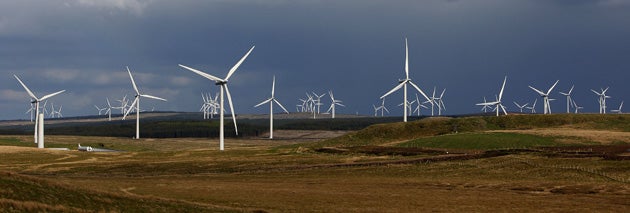Fuel bills set to soar to pay for green energy plan
Government's drive to cut carbon emissions will see huge rise in charges

Hundreds of thousands of new "green" jobs and a rise in household energy bills will be prefigured in the Government's plans to turn Britain into a low-carbon economy.
As many as 400,000 new employment opportunities are expected in a massive expansion of renewable energy; as Britain strives to meet two demanding climate change targets: cutting the UK's carbon emissions by 34 per cent on 1990 levels by 2020 (Britain's own pledge), and deriving 15 per cent of all energy from renewable sources by the same date (which may mean as much as 35 per cent of electricity, and is an EU commitment).
But with the opportunities come costs, and it is expected that the national switch to green energy supplies will add substantially to household energy bills.
According to Greenpeace, which has seen a draft of the Government's plans which will be set out in detail this week, the estimated cost of meeting the renewable energy target will be £100bn. This is the amount of funding needed for new energy infrastructure, including 7,000 more wind turbines, which would translate to an additional cost to the consumer of 25 per cent on gas bills and 17 per cent on electricity bills.
Some estimates suggest that total gas and electricity bills, currently averaging about £1,150 per household annually, might rise by £200 or even more, with a consequent danger of forcing many more families into fuel poverty – which is likely to be addressed in the announcement.
The plans to be unveiled by the Energy and Climate Change Secretary, Ed Miliband, will be the most far-reaching and extensive blueprint so far of how Britain can drastically switch its economy to a low carbon basis.
They will consist of a series of documents, headed by an Energy White Paper which will detail how the UK can meet the rolling "carbon budgets" demanded by the newly-established Committee on Climate Change, chaired by Lord (Adair) Turner.
They have been designed to force down CO2 emissions by 34 per cent in the next 11 years, and by at least 80 per cent on 1990 levels by 2050.
The White Paper will give CO2-cutting scenarios for all the main carbon-emitting sectors, from power generation and transport to homes and even agriculture.
It will be accompanied by three more major documents: the Renewable Energy Strategy, setting out the way to meeting the 15 per cent renewables target, the Low Carbon Industrial Strategy, indicating green jobs and growth opportunities, and a Low Carbon Transport Strategy showing the way forward in cutting transport emissions.
There may also be documents dealing with nuclear energy – setting out the Government's plans for where it intends to site new nuclear power stations in the UK, and the planning regime under which applications for new nuclear will be considered. There is also the idea of a "feed-in tariff" for small scale renewables, a guaranteed payment from the Government for companies or people who generate their own electricity and sell some of it back to the national grid.
However, Greenpeace believes the Government will not accept one of the major recommendations from Lord Turner's Committee on Climate Change – that the electricity sector should be fully decarbonised by 2030. Instead, it believes the Government will only say that it envisages 50 per cent of electricity to be derived from low carbon sources by 2025.
The battle plan: Fighting for the future
The launch this week of strategies for a British low-carbon future will be the most detailed such blueprint. It will involve four substantial documents that are key to Britain's fight against climate change and which will be launched simultaneously. They are:
*The Energy White Paper, which sets out the path for decarbonising the economy across all sectors;
*The Renewable Energy Strategy, which shows how the new and demanding targets for producing energy from renewable sources by 2020 can be met;
*The Low Carbon Industrial Strategy, which will detail how a low-carbon economy can offer opportunities for new jobs and economic growth;
*The Low Carbon Transport Strategy, which looks at how to cut carbon dioxide emissions from transport.
*In addition, there are likely to be announcements about consultations on feed-in tariffs and on renewable heat, a draft national policy statement on nuclear power and an announcement about the new Office of Renewable Energy Deployment.
Join our commenting forum
Join thought-provoking conversations, follow other Independent readers and see their replies
Comments
Bookmark popover
Removed from bookmarks